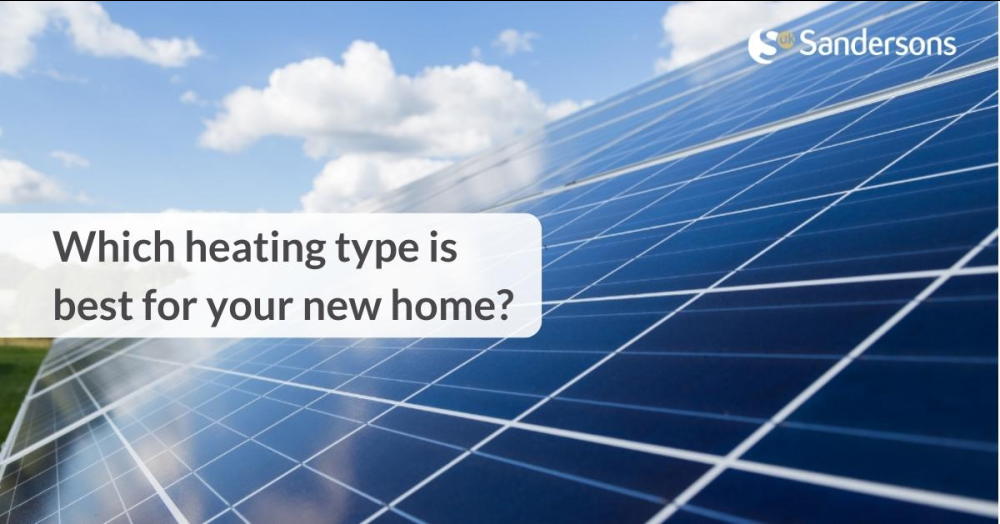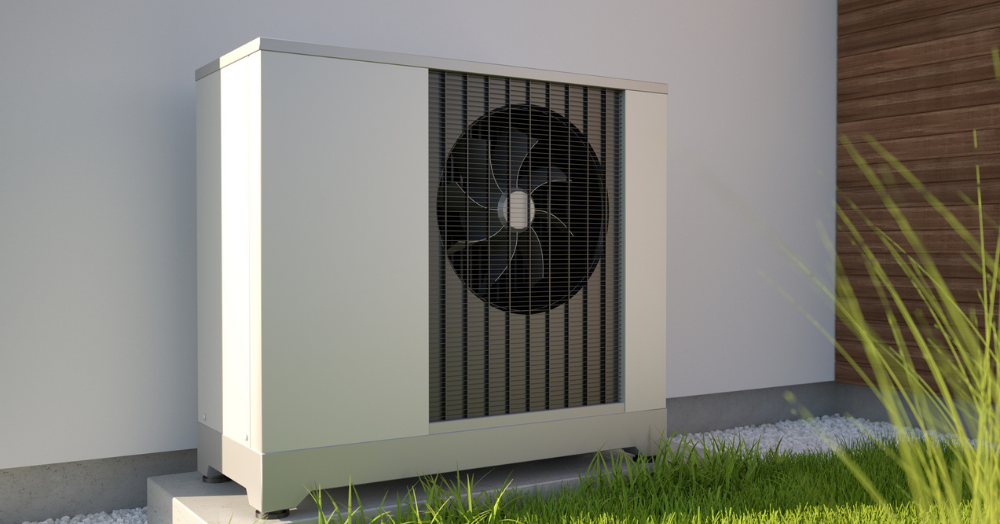With new build homes comes many options to heat them. It isn't necessarily straightforward to decide which one suits your new build though, as consideration of the proposed ventilation and hot water systems needs to be thoroughly thought of beforehand.
Air Source Heat Pump
As the most commonly used type of heat pump, air source heat pumps are suitable for many types of homes.
Air source heat pumps, sometimes referred to as an air-to-water source heat pump, transfers heat from the outside air to water. This heats your rooms via underfloor heating or radiators. It can also heat water stored in a hot water cylinder for your showers, baths and hot taps.
Heat from the air is absorbed into a fluid, which then passes through a heat exchanger and into the heat pump. This raises the temperature and then transfers that heat to water.
You'll need to endure you have a place outside your home where it will need to be fitted to a wall or placed on the ground, but it must have enough space around it to allow for a good flow of air.
Typical costs for air source heat pumps are around £7-£13,000, and we recommend speaking to several installers before you make your decision, as quotes can differ.
Ground Source Heat Pump
Ground source heat pumps are sometimes known as ground-to-water heat pumps. They work to transfer heat from the ground outside your home to heat radiators or underfloor heating. Again and similarly to air source heat pumps, ground source pumps can heat water in a hot water cylinder for your showers and hot taps.
A mixture of water and antifreeze, known as Thermal Transfer Fluid (or TTF) flows around a loop of pipe which is buried in your garden or outdoor space. This loop could either be a long or coiled pipe buried in trenches, or a longer loop (a probe) inserted into a borehole. These usually have a diameter of around 180mm. This means you'll need an area near your home suitable for digging trenches or boreholes, so that is something to bear in mind.
Heat from the ground is then absorbed into the fluid, which then passes through ah eat exchanger into the heat pump. The temperature is then raised, transferring that heat to water.
Prices typically begin at £24,000, but if you need to dig a borehole, it could be around £49,000. Again – speaking to installers will give you a good idea of prices. Running costs will depend on how your heat pump is designed and how it is operated. Savings will also depend on the system you're replacing.
Solar Panels
Solar water heating systems use energy from the sun to warm water for storage in a hot water cylinder or thermal store. Throughout the year, the amount of available solar energy varies, so this type of system won't provide all the water you'll need annually.
Using panels or tubes (solar collectors), these systems gather solar energy. The collectors convert the infra-red portion of visible light into heat. The fluid is pumped round a circuit using a combination of water and glycol, which passes through the hot water system. These collectors come in two types, evacuated tubes and flat plate collectors.
As a result, a conventional boiler or immersion heater is normally used to make up the difference. As the amount of heat provided is generally small (usually less than 10% of the requirement the home needs to heat efficiently), it isn't usually considered worthwhile, but they can go some way to contributing to heating your home.
There are other benefits, including providing around 90% of your hot water requirements in the summer, and dropping to 25% in the winter.
Biomass Boiler
Biomass boilers use natural materials to burn, such as chips, logs or wood pellets. These power hot water boilers and also provide heating.
What is biomass?
Biomass is material that comes from plants or animals, that is renewable. In many countries it is an important fuel and in developing countries is used for cooking and heating.
Biomass boilers offer a great heating solution that really goes above and beyond paying for itself. Generally, they are cheaper to run than conventional boilers, but they do cost more to buy. Up until recently, the government were helping to fund these schemes, but that came to an end at the end of March 2022.
Biomass boilers need more space than gas or oil boilers, as the system is larger, and with that high initial installation cost, it isn't an option for all. However, you can expect a reliable system, and one that reduces waste significantly, so if you were looking to go green it may be something you look into.
Infrared
Infrared heating is radiant heating, which differs from conduction and convention. This is because it transfers heat to people and objects directly, without anything else being heated in between, such as air, metal or water.
Infrared, being direct, puts a stop to dust circulation and reduces heat loss due to its direct approach, as opposed to heating up the space in a room. This process makes the infrared panels highly efficient, and a healthier and more effective way to heat a property.
Most infrared heaters run on electricity, which can be costly, and focused heating can leave others feeling cold. These heaters must also not be obstructed by objects. The air can remain relatively cold as well, but they do provide instant heat. Infrared panels operate most effectively at surface temperatures of around 90°c – this means the panels would be hot to touch but safe if just brushing against the surface.
A 500w infrared heater used roughly for 11 hours a day would expect to total a running cost of around £50 per year. By comparison,a gas-supplied heater (with the same output and running time) would come in at just over £100. A 500w oil-filled radiator used for the same duration will cost nearly £300. These are stark differences!

With so much choice away from conventional heating systems, it really is down to the individual and their financial circumstances to make the best choice for their new home, but we encourage you to think of all options, as there are indeed, so many!










